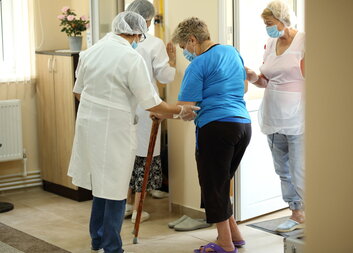The caregiver is a new profession in development and emerging in the Republic of Moldova that comes to the aid of the elderly and those with special needs. The necessity to introduce a new profession has arisen due to an insufficient number of nurses, who consequently cannot deal with the high demand in homecare services. Caritas Czech Republic is closely cooperating with local stakeholders to introduce the new profession of caregiver.
Exodus of work force
The shortage of medical and social personnel comes against the background of mass emigration that Moldova has been experiencing for over 20 years. According to unofficial statistics, about 40% of social and medical professionals left the country, the scale of the phenomenon being confirmed by the authorities and reflected in specialized studies.
Due to the continuous exodus of work force and the increase in the number of elderly people, the providers of medical and social services report that they face difficulties in finding people with relevant training and experience who could work as caregivers in the homecare field.
Such countries as Romania, Bosnia and Herzegovina and the Czech Republic, also faced similar issues. The solution was as pragmatic as possible, namely creating an alternative training opportunity for the staff in the homecare field. This type of learning, also known as a “lifelong learning” process, in Moldova is part of an existing sub-field, which includes a lifelong vocational training for adults.
Training program for caregivers
In practice, the new training program for caregivers will include such topics as the safety and integrity of the beneficiary, communication and interpersonal relationships in the provision of home care services, basics on physiological and pathological aging, practical issues on procedures and medical interventions, as well as other topics relevant for the caregiver profession. The training will not exceed 400 hours, offering the possibility to people with limited training and experience in the social and medical fields to acquire knowledge and skills (practical and theoretical) needed to provide home care services. At the end of this program, the trained persons would obtain the qualification of caregiver and would be eligible to work within a public or private provider of both medical and social home care services.
The promoters of this initiative and the member organizations of the Union "Network of Non-commercial Organizations Providing Community Care" (URONPIC), in their day-to-day practice, have run into the need for such a training program for caregivers. Tamara Adașan, Director of Public Association Homecare, mentions that: “The new caregiver profession gives real hope for solving, at least in part, the problems of the elderly, which depend on the care of others. Home care for the elderly is a perfect activity for sociable people, who want to change for the better the lives of vulnerable people. Of course, these people will have to possess a high degree of understanding and compassion for those around them and, especially, for their suffering. The caregiver is a professional who provides care services at the beneficiary's home and brings about the most important benefit, and namely contributes to maintaining an optimal state of health of the elderly. "
In the process of developing the package of documents needed to legislate the new profession, the most relevant existing models from abroad were analyzed, including the experience of the Czech Republic, where the home caregiver is a component part of the medical and social care system. As a provider of medical and social services in the Czech Republic and implementer of development projects in numerous countries including Moldova, Caritas Czech Republic supports the initiatives of URONPIC member organizations and is an active player in promoting and developing the new caregiver profession.
More elderly people need specialized care
In order to blend harmoniously the international experience with the reality and the national context, within the process of identifying the most appropriate approach for finalizing and configuring the caregiver profession, Director of CASMED, Natalia Postolachi emphasized that: “As people live longer, and the development of chronic diseases is increasing, more elderly people need specialized care for longer periods of time. The job of a home caregiver is a way to ensure quality care for those who have limited autonomy. Taking on complex and sensitive tasks, such as assisting people with mobility problems when traveling around the house, maintaining proper hygiene, sanitizing the space, helping to maintain optimal health of people who cannot take care of themselves, the caregiver comes to reduce the burden placed on the shoulders of the family. ”
So far, and occupational profile and standard have been developed and approved and currently the working team is in the process of developing other necessary documents such as the qualification standard and the content of the training program.
Thus, combining the efforts of organizations active in the field of home care in the Republic of Moldova, of central authorities and the financial support from external partners, the emergence of a caregiver profession and of a training program for new specialists has to significantly reduce the burden on the care system for the elderly and the vulnerable at national level and will contribute to increasing the quality of life of those who are cared for.
Author: Anastasia Vasiliev, Project Manager, Caritas Czech Republic in Moldova, anastasia.vrancean@caritas.cz





